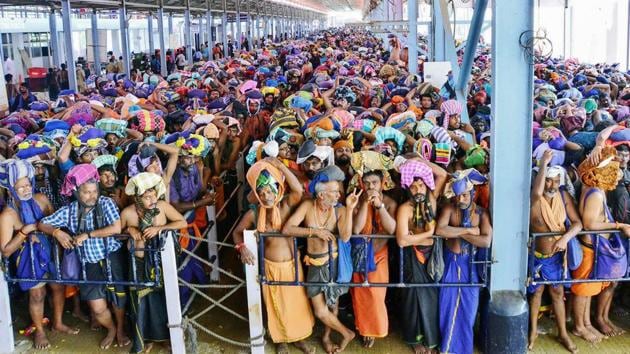9-judge SC bench for Sabarimala petitions
The rule was held to be violative of the right of Hindu women under Article 25 to practice their religion.
A nine-judge bench of the Supreme Court will hear at least 60 review petitions challenging the 2018 verdict of the apex court in the Sabarimala temple entry case from January 13, a notice published on the Supreme Court website said.

The composition of the bench was, however, not disclosed.
On September 28, 2018, a five-judge Constitution bench of the Supreme Court headed by then Chief Justice Dipak Misra struck down Rule 3(b) of the Kerala Hindu Places of Public Worship (Authorisation of Entry) Rules, 1965, which was the basis for barring entry of women between the ages of 10 and 50 years into the Sabarimala temple.
The rule was held to be violative of the right of Hindu women under Article 25 to practice their religion.
Women of reproductive age were restricted from entering the over 800-year-old shrine in south Kerala’s Pathanamthitta district because its presiding deity, Lord Ayyappa, is considered to be a celibate.
Both the BJP and the Congress opposed the court’s verdict. Subsequently, attempts by the Left government in Kerala to implement the judgment of the court had met with stiff resistance, leading to violence in the region.
Nearly 60 review petitions were filed against the 2018 judgment, which were heard in open court by the Supreme Court. The court eventually passed an order on November 14 last year stating that the review petitions will be kept pending and will be decided only after the court answers similar issues in three other cases relating to Muslim and Parsi women.
Two women from Kerala subsequently petitioned the top court alleging that the Kerala government was refusing to implement the 2018 judgment of the court and seeking police protection to enter the temple.
When those petitions came up for hearing on December 13 last year, the court, despite acknowledging that there was no stay of its 2018 judgment, refused to pass any directions, including ordering police protection to facilitate entry of women into the temple for the time being, stating that it was an “emotive issue” which could escalate tensions in the state.
The bench headed by CJI Bobde agreed during that hearing to constitute a larger bench at the earliest to hear the matter.
“It is good that the court did not waste any time in listing the review petitions. Since the matter is listed before a nine-judge bench, chances are high that the Supreme Court’s judgment in Shirur Mutt case, which was given by a seven-judge bench could be reconsidered to interpret the terminology “religious denomination” and “essential religious practices”, Usha Nandini, a Supreme Court advocate and one of the review petitioners, said on Monday.






